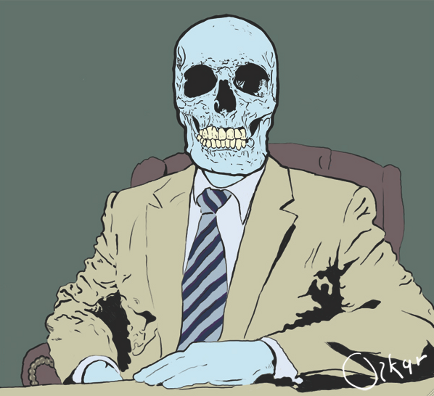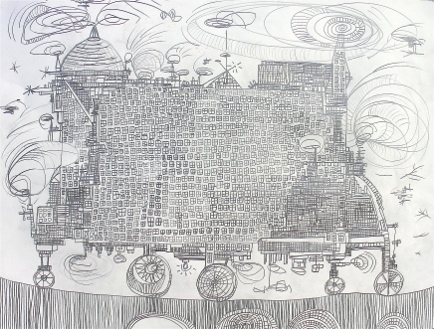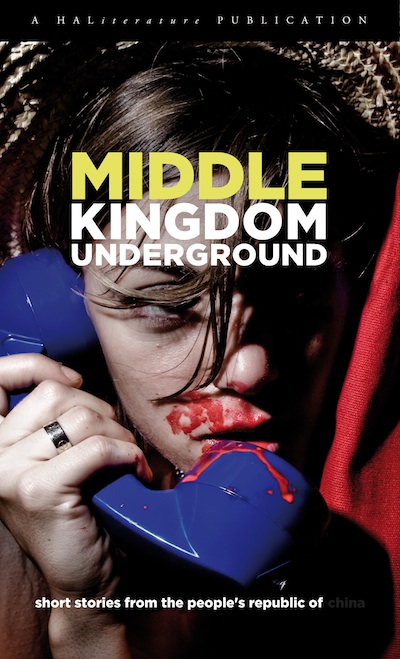Archived entries for Uncategorized
Office Poetry
Roses are red, working 9 to 5
when I go postal
no one will be left alive
It’s Monday morning. Your favorite part of the week. You’ve just spent a migrant workers’ fortune on trendy overpriced restaurants and more cocktails than you can remember and all you got for it was a bloody hangover and a 3am make-out at M2. Your apartment looks like a crack house for DVD and Sherpas addicts. It’s all good though, cause Super Aiyi is coming today and you know what that means: clean underwear! Yesssssss!. Continue reading…
Chaos Within
A strictly musical treatise on harmony and dissonance
by Björn Wahlström
Harmony does not move. It rests in itself, content, lazy, and somewhat arrogant. Consonance and dissonance move, promises to be fulfilled or broken, seeking always more, struggling toward something. No rest.
Harmony bores us when unchallenged, and as much as we strive to achieve it when in dissonance, we rest on it only long enough to catch our breath, then to be thrown out again. Contrary to what musicians will tell you we build our dissonances not to create movement between different harmonies, but because they are as much in our nature as harmony itself. Harmony in itself is uninteresting.
Despite the fact that words like “unpleasant” and “grating” are often used to explain dissonance, in fact all music with a harmonic or tonal basis — even music which is perceived as generally harmonious — incorporates dissonance. The buildup and release of tension which can occur on every level – from the subtle to the crass – is to a great degree responsible for what we perceive as beauty, emotion, and expressiveness. There is fear, conflict, dispute, anger and the threat of chaos in dissonance; it knows not where it’s going, knows only its own restlessness. To say that all dissonances lead to harmony is a lie; uncertainty is in its nature, and so also in the nature of harmony. Isolde sings her Liebestod to the sleeping Tristan, climbing higher through the cycles of dissonances and relative harmony, and does not – can not – strive to that last harmonious chord, knows not how to escape the knowledge that her loved one lies dead before her. The cycle seems endless, but finally, in a brilliant and harmonious D minor the orchestra exits victorious on top, and the movement stops, Isolde falling dead with it, in harmony now herself. It appears to me that any good harmony must live with the fact that it will never go unchallenged, and that it perhaps even harbors the desire for dissonance within itself.
Phone Calls
by Hunter Braithwaite
1.
Sometimes I work backwards to create premonitory dreams. I look for auguries. Clouds moving quickly or the eye contact of strangers. Omens help because they point to reason. Nothing is tougher than unreasonable loss.
The night the police came I might have been dreaming a banging noise. I think of crunching ice with my teeth, bits of broken ice sliding down my face until they melt. Then my teeth bite stones until they begin to break themselves. The noise brings me back to the real world, the one without symbols, and becomes the sound of a gloved knuckle rapping on our oak door. The doorbell rings too. I went downstairs–I remember the feeling of each one. The carpet mashing beneath my weight, and then springing up again.
“There’s been an accident.” My breath coagulated, began sticking to my lungs like thick mucus. I devoted most of my energy, my trembling 3am sentience to moving the air through my body. I invited the guests in. The officers, a patrolman that I didn’t recognize, and a chaplain told me what had happened.
The car carrying my nephew Riley had been navigated around a turn too sharply and, after a graceful spiral through the air, came to rest on a fire hydrant. The hydrant made its way through the passenger window and crushed his head and neck. A final indignity came when the shock of impact split the hydrant and filled the cabin with a tide of sewer water.
The water must have diluted the blood. A blush pond surrounding an upturned car. Broken glass looks like ice. Melting. Broken teeth. The glow of the streetlight.
Now how do you make sense of that?
My wife came down the stairs in her nightgown. She’s always been a heavy sleeper.
You don’t. It shakes you so deeply that you’ll never make sense of anything again.
The order of things gets mixed up here. The men said the body they found, head pushed in and dripping, belonged to Riley. It pains me now, but I was relieved that it wasn’t Jake, my boy, who was dead. I turned to Caroline and said that there had been an accident. Riley had been killed. I worry that my voice betrayed a deep sense of relief. I’m sure the police noticed. Caroline said there was a mistake. Walking downstairs she had passed Riley’s bedroom. He had left the light on and was asleep. She turned it off and came down to see what the commotion was. So there must be a mistake. I began to laugh.
The Chaplain produced Riley’s drivers license. But Riley was there in his bed. I ran to his room and punched him hard in the stomach. He’d loaned Jake his drivers license so he could buy beer for his idiot friends.
And so we had two bedrooms and one body.
2.
We went to the police station, then the morgue. There we saw Jake. He had a series of hickies on his neck and shoulders, although the bruising might have been from the seat belt. I’ll believe hickies. His last night spent with a young girl—caught up, unable and unwilling to see anything else. These young kids, they don’t know.
The hydrant had crushed his face pretty much completely. My son was just an eggshell. Caroline couldn’t look at him like this; she turned into me and shook without noise. But I couldn’t stop looking.
It was the last time I’d see him when he wasn’t looking. The true glimpses of our babies happen with their guard down.
I remember the sonogram. His face looked like the moon in the sky. Something that will always be tethered to me; something with shadows I’ll never really understand. Lunar Maria, that’s the name of the shadows. Lunar Seas. If we had a girl, she would have been Maria. But we were given a boy, and his name was Jacob.
Over a decade later I walked in on him masturbating. He was before a mirror, admiring himself. I stood and watched him for longer than I should have. It’s unfair, I remember thinking, that parents shouldn’t be able to see their children grow in those ways. I was thinking about myself at his age. We looked exactly the same. He turned and saw me, kicked the door shut with his foot, and we never mentioned it. Not at dinner or anytime after.
Caroline and I signed the death certificate and drove home. Dawn, a paraplegic struggling up the road.
3.
We live our lives like a toddler swinging his arms, trying to get someone’s attention. Then a jolt comes and the shoulder gives. It hangs stiff and loose, if that makes sense, like a tree limb coated in ice. Our arm dislocated, we shake in pain and yet marvel at our own fragility.
Blame helps for the time being.
To be clear, I’d never really cared for my nephew, but you have to compromise sometimes. Sharon drank. That was her occupation and her hobby rolled into one. If not for the broken furniture and the subpoenas, her life would have been one of contentment and satisfaction. But that’s just wishful thinking.
Sharon came and visited once. This was ’03. She looked bad. Her second DUI had her in jail for thirty days, with another ninety days suspended. Normal people look at the suspended time as a faint remembrance. The shaky morning after a nightmare. But for Sharon, who’d wake up drunk and covered in burns, that ninety was debit.
I felt like we were punished for wishing death on Riley. But I also felt that Riley bought his life with Jake’s death. I kicked him out of the house. Never heard from him again. Caroline never forgave me for this. She left too. My crackup followed, I’ll admit it.
I started sleeping in Jake’s bedroom. I looked at the pictures on his computer. I began to wear his clothing. I went through his phone and invented details for the text messages. One night I kept drinking until past midnight and then started calling numbers. There were some answers, girls mainly, whispering into the mouthpiece of their phone. They knew that Jake was gone, but in the darkness of their bedrooms, that didn’t matter. Sometimes I would weep. Other times, I’d shout until the line went dead.
Lee, Me and the Fallacy
 by Dena
by Dena
Lee worked in a Kung-Fu Shoe Shop. The shop makes and sells Kung-Fu shoes. They are very fine slippers. The soles are made of hundreds of layers of fine cotton hand-stitched tight to form the shoe’s insole and outsole. The uppers are plain or embroidered cotton.
Lee calls them Thousand Cloud shoes. He dislikes my calling them Kung-Fu shoes as they have other practical applications.
Lee was insulted when I asked him whether all the little children in the shop like hand sewing the soles of Thousand Cloud Shoes. He told me it is a shoe shop, not a sweat shop. The Master has run the shop since the very dawn of time and has always been fair and just.
Lee will not tell me why he parted with his Thousand Cloud job. He does not like to talk about leaving China. His countenance is staid. He is stoic. He is a living Steinbeck novel.
I cannot imagine letting him go. He is my best employee. Lee says I am the worst boss he has ever had and that I drive him harder than an ox in a rice paddy. He says I am mean and racist and a dirty red-haired devil. I let him get away with this because he is right.
Lee brought me a pair of Thousand Clouds as a gift after his first visit home in seventeen years. I love my Thousand Cloud shoes. They wear like a thousand clouds. They have a red Chinese character embroidered on the top. I asked Lee what it means and he said it means asshole.
Lee said it appears the Kung-Fu Shoe Shop Master is wealthier than he was twenty years ago. He said the workers look better off than they did before. The factory girls are resplendent in their fake designer clothes. They reject Mao style with their powerful pockets full of Mao money. They do not wear the Thousand Clouds. They emulate the city’s newly minted aristocracy. They long to hold larger pieces of the new wealth. The wealth is to be spread out and shared, but people on the top tier and the bottom tier are not included in this philosophy.
Lee is stunned by the way the city has developed around the unchanged shoe shop. Lee is disturbed by urban China. Foreigners are everywhere and road signs are in English and Chinese. He could not see the sky for the malls and financial buildings and Chanel billboards.
He said his city is sprawled out just like the suburbs of Los Angeles, except that the tract houses are apartments stacked on top of one another like Legos.
He said the apartment buildings are short compared to buildings further in the city, but that they are incredibly tall compared to the buildings just outside of most American cities. He said the view from his brother’s 20th floor window the city is like a giant’s version of the suburbs of L.A. except that many more people live in each unit than in Los Angeles, and the green spaces in between are like giant suburban American backyards. He said the towers line up and disappear over every horizon. He said they hold rooms crowded with three generations of families and sport laundry hanging off of all the balconies. They hold rooms of one or two people earning good money. Some are very nice and some are not, but each little dwelling has its own sink and modern bathroom. There are still old style dwellings in the city, but they are few and appear to be populated by migrants and not city folk.
He said the ordinary people of his city still live their lives openly unlike in L.A., where people huddle in their backyards and living rooms, afraid to look at each other on sterile street corners. Lee likes the ghettos of LA the best because community thrives within the confines of the poverty and violence. People look and live and there are things like street vendors.
He was relieved to see the nature of Chinese city life is largely untouched. A middle class is slowly emerging but Lee can see it’s false: it’s poverty plus a large television set , a laptop computer and many pairs of shoes. The people have more money but it’s just enough. The average Chinese isn’t mobile and won’t cease to be productive.
Lee says America and China are reaching toward each other in reverse. The only difference is the American people live under fascism without the pleasures of socialism. Americans are losing excess comfort while Chinese are gaining it.
Lee wants to go home.
Lee can’t go home. Home is much like America: a capitalist society without freedom of expression. Each nation poses. In either nation one can be arrested and tried without due process simply for speaking out loud. This is nothing new in China but it’s new for America. The rights of Americans are corrupted. The law was shattered by greed.
Lee wants to go to Cuba where the government doesn’t lie about wealth or freedom. It is what it is, and if you don’t like it you will disappear.
I told Lee there is a Chinese-Cuban restaurant in Garden Grove but that he is a U.S. citizen now. He’s not allowed to go to Cuba.
Lee said this is the point. Honest oppression is the best oppression.
I told him to be quiet and get back to work.




